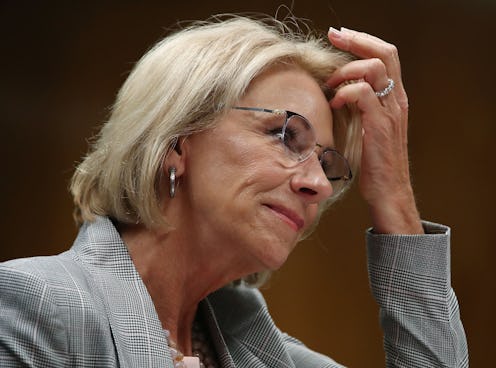News
Betsy DeVos Changed Her Mind On Whether Schools Can Call ICE On Students

In a surprising reversal of a previously held opinion, Betsy DeVos changed her mind on schools calling ICE on students. Previously, DeVos believed that the decision on whether or not to call Immigrations and Customs Enforcement should be left up to educators and school officials. But now, DeVos maintains that all children should have the right to an education, regardless of their citizenship status.
According to The Hill, the sudden change of opinion came up at a Senate Appropriations subcommittee meeting, originally meant to discuss a new education budget request by Trump. However, during the meeting, Democratic Senator Chris Murphy asked DeVos if schools have the power to call ICE on their students.
DeVos tried to skirt the question (as seen in the video below), initially saying, "I think a school is a sacrosanct place for students to be able to learn, and they should be protected there."
However, Senator Murphy pushed for a stronger and more concrete example, pointing out that she seemed to be purposely avoiding a direct answer to his question about the relationship between ICE and school systems.
Upon further pressing, DeVos rephrased her statement. "I think educators know in their hearts that they need to ensure that students have a safe place to learn."
Finally, Murphy asked her point blank, "Why are you so- why are you not answering the question?"
"In a school setting, a student has the right to be there and the right to learn," DeVos said. "And so- everything surrounding that should protect that and enhance that student's opportunity and that student's environment... I don't think they can [call ICE.]"
Murphy's desire to get DeVos to state equivocally whether educators do or do not have the power to get involved in immigration battles is not necessarily a new story. In May, when DeVos told the House Committee on Education and the Workforce that schools and local communities could decide for themselves about when to get ICE involved, The Washington Post reported there was similar frustration with her ambiguity.
What's more, after her May 22 statement, over 100 congressmen and congresswomen came together to sign a petition demanding that DeVos clarify her intent in discussing the relationship between educators and ICE.
The letter explicitly demanded that she make a "swift, decisive, and widely disseminated correction to...testimony that unequivocally clarifies state and school district obligations to serve all children, regardless of immigration status."
The main concern was that educators would have no precedent or ruling by their current secretary of education on how to proceed, and therefore could ratchet up fear in immigrant communities, with families potentially pulling their children out of school for fear of being deported by school administrators. "Left uncorrected," the letter explained, "your testimony could do irreparable harm to educational opportunity for undocumented children."
According to The Washington Post, the legal precedent most relevant to this issue is 1982's Plyler v. Doe, which established that "the right to a free public education extends to all young people, regardless of immigration status." In other words, as long as a child is in the United States, they should have access to an education. This is especially relevant given how high the number of undocumented children in the United States has been in recent years. The Pew Research Center estimates that there are approximately 3.9 million students between the kindergarten and 12th grade whose parents are undocumented.
And given how long and arduous the processes of deportation and citizenship both can be, this ruling is critical for immigrant children caught in the crosshairs.